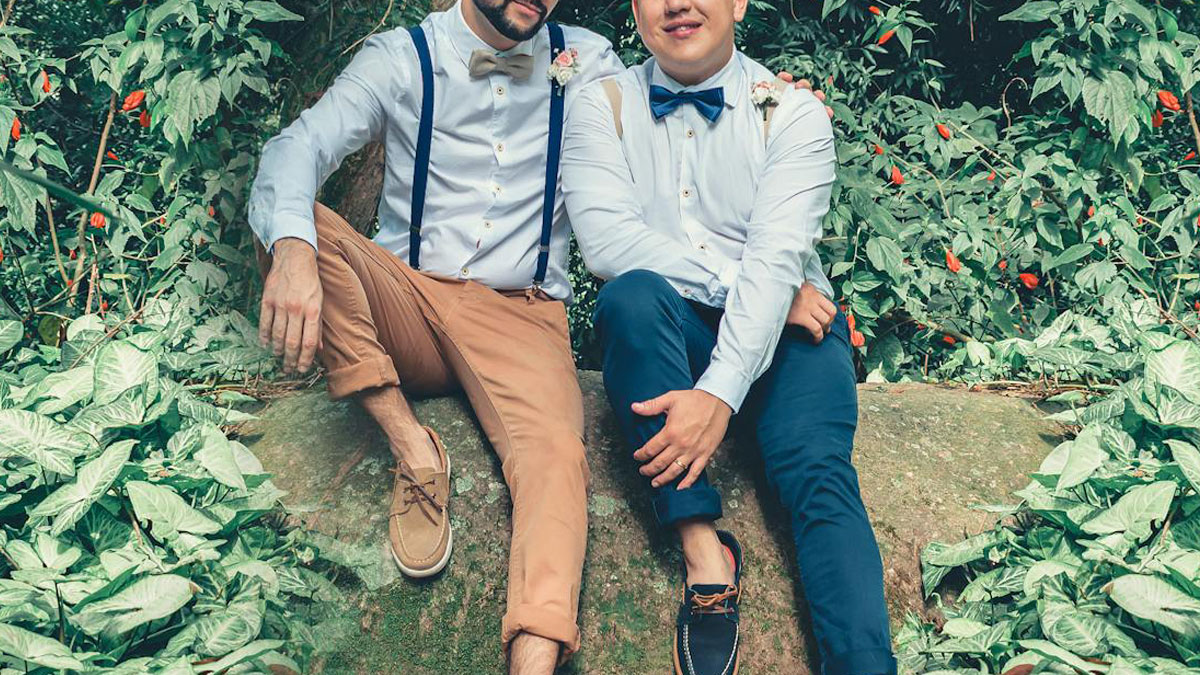
Mom Doesn’t Want Brother’s BF At Family Events To “Protect” Her Child, Loses A Free Nanny
For many people, it’s important that their relationships/family/”>family is not only supportive of them but accepting of their partner, too, which, unfortunately, is not always the case.
This redditor’s family, for instance, was seemingly very welcoming when he introduced his boyfriend to them. However, things took a turn for the worse when his sister asked him not to bring his partner to family get-togethers anymore. To make matters worse, that eventually snowballed into a family-wide row.
For many people it’s important that their families are accepting of their partner
Image credits: Gustavo Peres / Pexels (not the actual photo)
This netizen’s sister asked him to stop bringing his boyfriend to family events
Image credits: Kaboompics.com / Pexels (not the actual photo)
Image credits: Guillaume Issaly / Unsplash (not the actual photo)
Image credits: anonymous
Image credits: RDNE Stock project / Pexels (not the actual photo)
Introducing your partner to your family can be smooth sailing or a total disaster
While you can choose your partner, you can’t really choose who their friends and family are. And that can end in one of two ways – you might expand the circle of people you love dearly or end up resenting your significant other’s kin. Based on an INSIDER poll, the chances are 50/50—at least when it comes to the partner’s parents—as roughly 50% of respondents consider time with their in-laws a “very positive” or a “positive” experience. (On the other end, around 3% say it’s something “very negative”.)
Those who are not on such good terms with their in-laws are probably the reason why there are so many jokes or prejudice regarding in-law relationships; the abundance of quips about dealing with the mother-in-law, for instance, or the pop culture image of the tough father-in-law needing to make sure his daughter is in good hands. But the parents are not the only ones to get acquainted with; meeting the partner’s siblings can also range from smooth sailing to resembling a war zone.
Author of Brothers, Sisters, Strangers: Sibling Estrangement and the Road to Reconciliation, Fern Schumer Chapman, suggested that one of the siblings choosing a partner can be a perilous moment in their relationship. “A new partner may feel threatened by, or jealous of, closeness between brothers and sisters,” she pointed out in a piece for Psychology Today, adding that cultivating a shared interest can help the partner and the sibling pave the way for a connection.
The OP noted that when he introduced his boyfriend to his family members, all of them, including his sister, were nice and respectful. That was the reason why he was so taken aback by his sibling’s request that he not bring his partner to family events anymore; he didn’t think it was fair for him to have to hide part of his life to make her feel comfortable.
Image credits: Nicholas Swatz / Pexels (not the actual photo)
Many LGBTQIA+ people experience lack of acceptance, even from their own families
Unfortunately, many LGBTQIA+ people can’t be their true selves, even with their own family. According to Statista, only around a quarter of LGBTQ youth say that they can be themselves as a LGBTQ person at home. A similar number reportedly have families who show their support by getting involved in the community. However, close to 70% of the surveyed youth have experienced families making negative comments about LGBTQ people or making them feel bad about being part of the community.
Clinical psychologist Jennifer O’Brien, Ph.D., emphasized that lack of acceptance of sexual minorities can have a strong negative psychological impact on LGBT+ people. She pointed out that homophobia, discrimination, and stigma they face can put them “at a higher risk of developing mental health issues due to chronic stress associated with these experiences”.
Other research seconds the idea that negative attitudes towards the LGBT+ community can be linked to mental disorders such as depression, anxiety, and stress or trauma-related disorders. It also suggests that “Most of homophobic attitudes are based on the principle of heteronormativity according to which heterosexuality is the standard for legitimating social and sexual relationships and homosexuality is considered as an abnormal variant.”
It seems that the OP’s sister, too, viewed heterosexuality as the standard. That’s why, when the sibling row made it to the family chat, a cousin pointed out that if the child is old enough to understand that Amanda and Mike are married, then he’s old enough to understand that his uncle has a boyfriend. But some other family members took a different side, consequently dividing the family into two camps, just like the OP’s story divided the netizens in the comments.
Many people didn’t think the OP was being a jerk to his sister
Some, however, shared a different opinion
"Kid's aren't confused by love; they're confused by people acting like it's something to hide." I love that his dad said this. Exactly right.
Yep. We always just said, they love each other. It's really that simple. Kids accept love. It's very easy for them to understand.
Load More Replies...Kids "asking awkward questions" is one of the most common points homophobes hide behind. I see it all the time in my country. What's with the "expose to LGBT" thing? Being gay is not radiation, it won't cause you to melt down when you're "exposed" to it.
It's so baffling to me, because eventually that kid is going to ask where babies come from. How is the threat of having to answer THAT awkward question not worrying Amanda 24/7? And also, if the kid is apparently going to be (or already is) asking "awkward questions" about a relationship between two men, that means that Amanda has ALREADY started to indoctrinate him that heterosexuality is the only normal and everything else is deviant. Otherwise why would the kid even ASK questions about OP and Ryan? At 4 he's just going to assume Ryan is his uncle's best friend. If the kid has seen them holding hands or cuddling, at WORST he's asked "Is Ryan my uncle's boyfriend?" and then the answer isn't awkward at all - it's just "Yes." If Amanda REALLY wants to be magnanimous, she can add "Some people like boys and some people like girls. It's okay to like boys if you're a boy, and it's okay to like girls if you're a boy."
Load More Replies..."Kid's aren't confused by love; they're confused by people acting like it's something to hide." I love that his dad said this. Exactly right.
Yep. We always just said, they love each other. It's really that simple. Kids accept love. It's very easy for them to understand.
Load More Replies...Kids "asking awkward questions" is one of the most common points homophobes hide behind. I see it all the time in my country. What's with the "expose to LGBT" thing? Being gay is not radiation, it won't cause you to melt down when you're "exposed" to it.
It's so baffling to me, because eventually that kid is going to ask where babies come from. How is the threat of having to answer THAT awkward question not worrying Amanda 24/7? And also, if the kid is apparently going to be (or already is) asking "awkward questions" about a relationship between two men, that means that Amanda has ALREADY started to indoctrinate him that heterosexuality is the only normal and everything else is deviant. Otherwise why would the kid even ASK questions about OP and Ryan? At 4 he's just going to assume Ryan is his uncle's best friend. If the kid has seen them holding hands or cuddling, at WORST he's asked "Is Ryan my uncle's boyfriend?" and then the answer isn't awkward at all - it's just "Yes." If Amanda REALLY wants to be magnanimous, she can add "Some people like boys and some people like girls. It's okay to like boys if you're a boy, and it's okay to like girls if you're a boy."
Load More Replies...
 Dark Mode
Dark Mode 

 No fees, cancel anytime
No fees, cancel anytime 






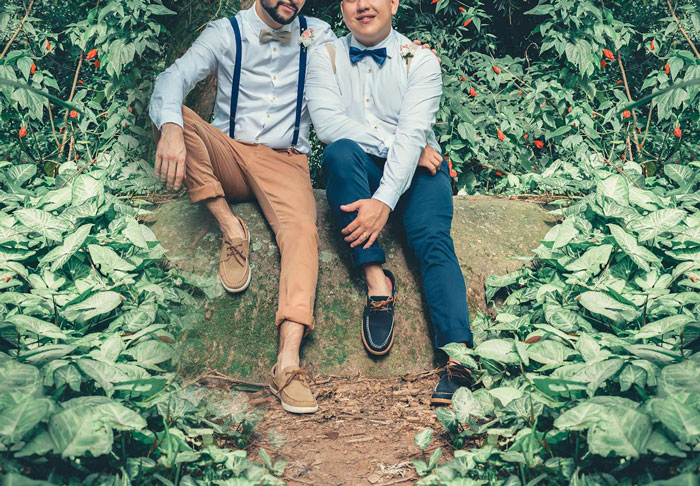
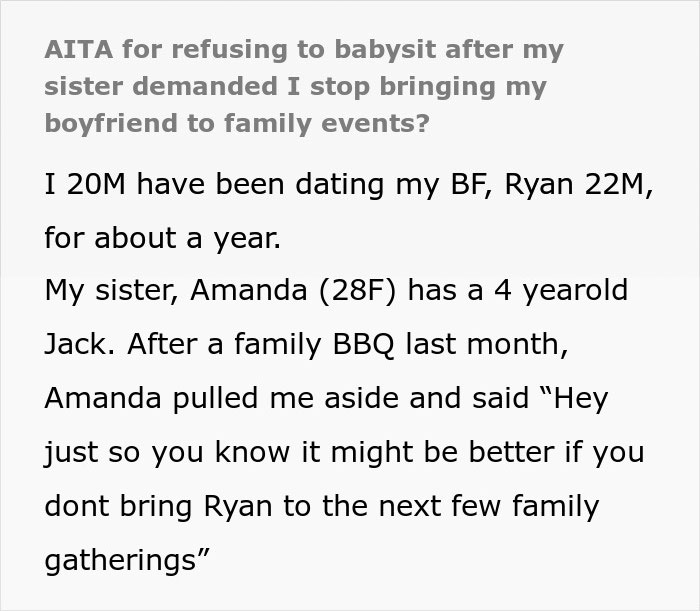
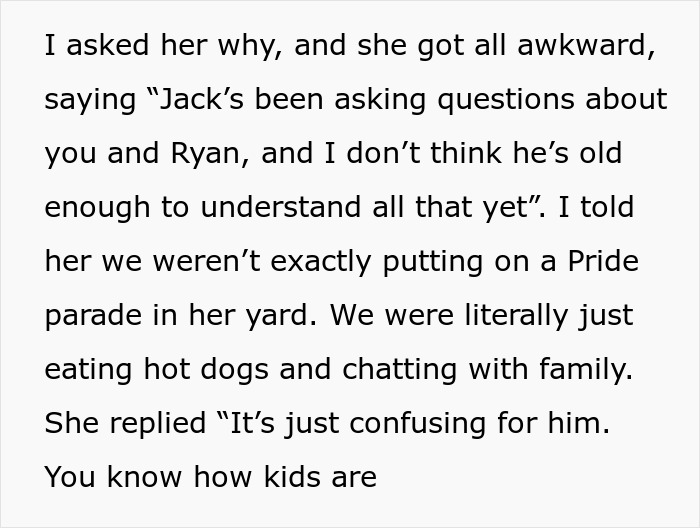
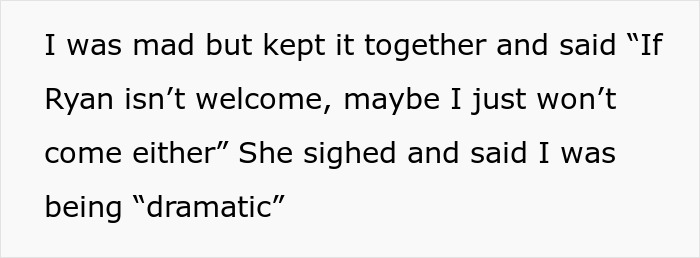
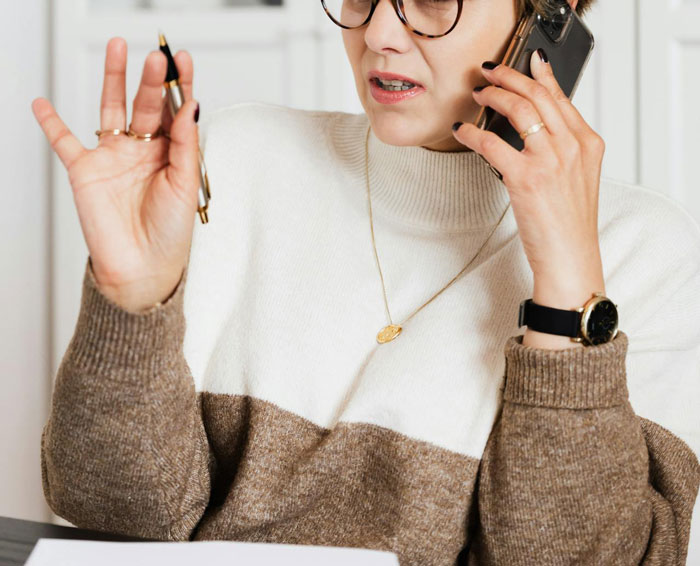
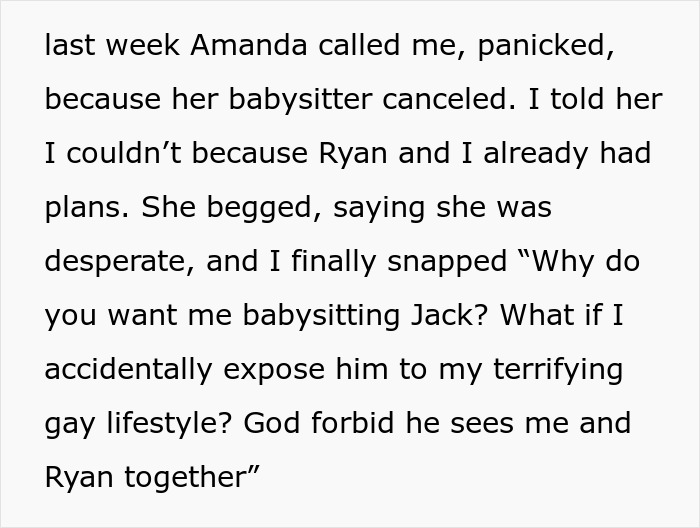

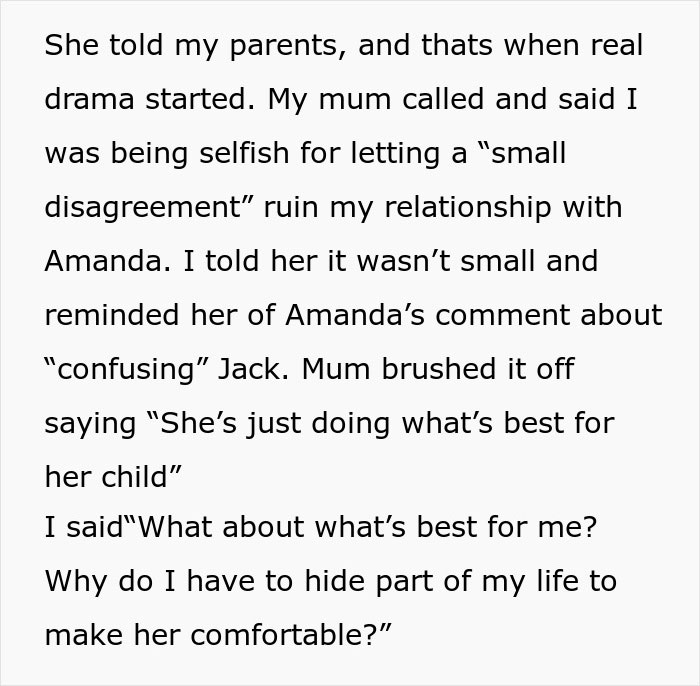

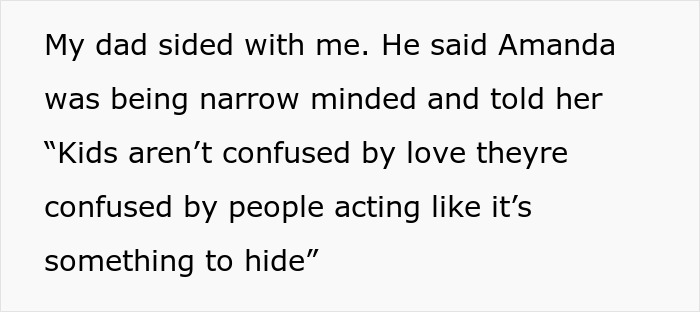
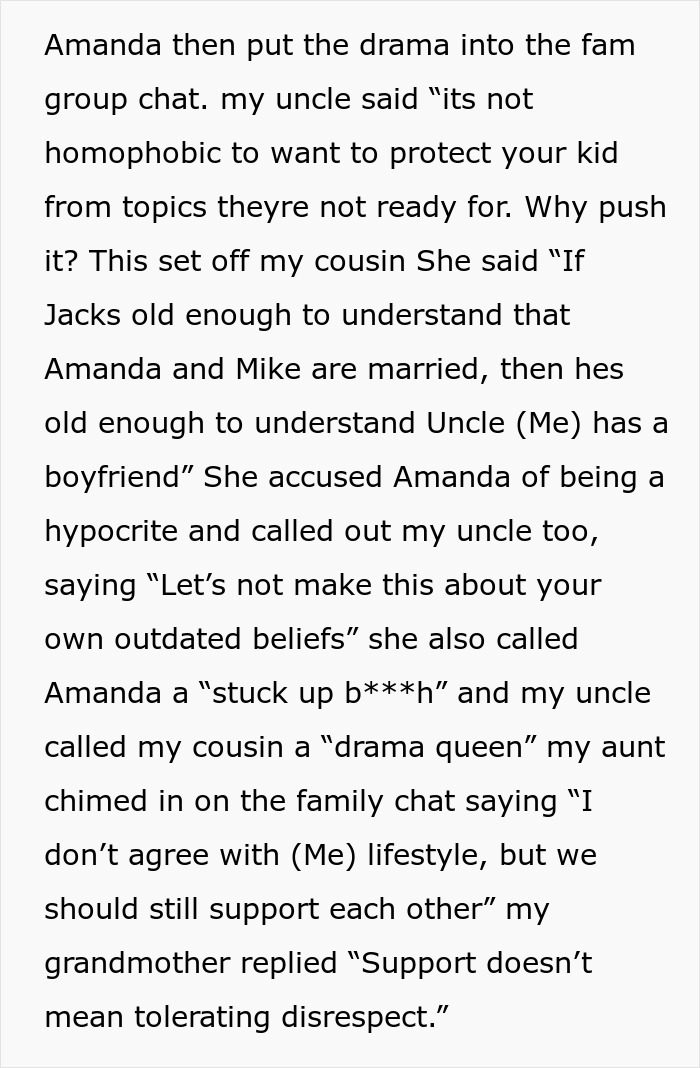

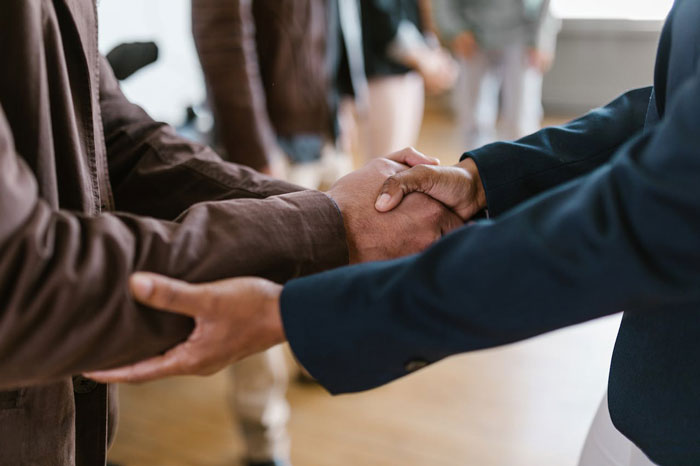

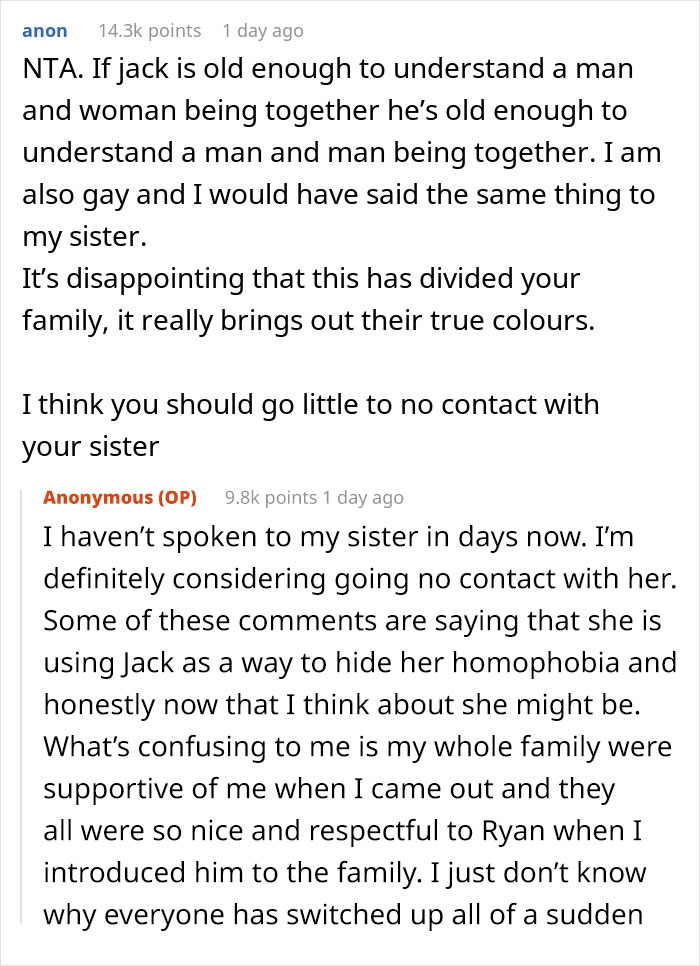

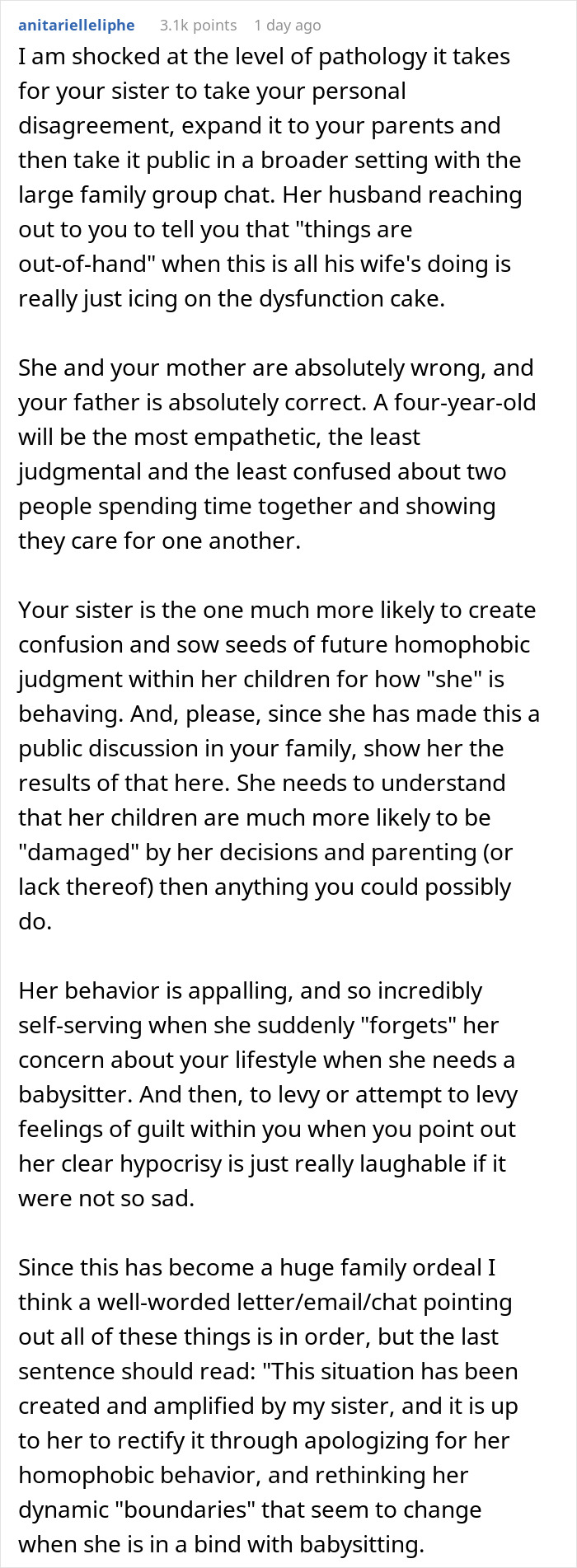
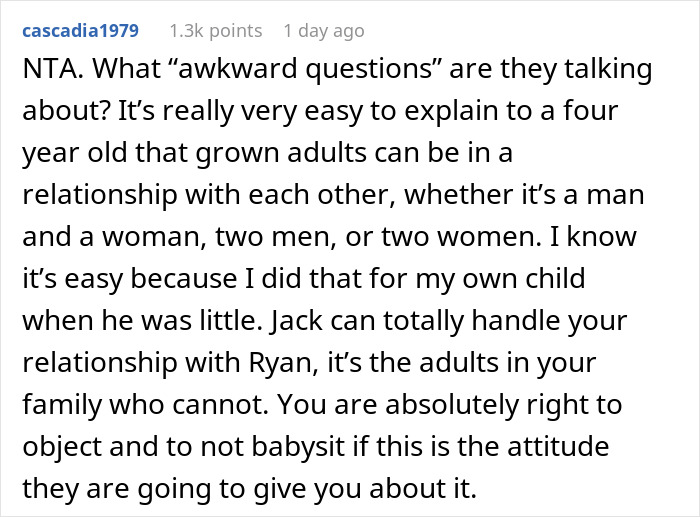
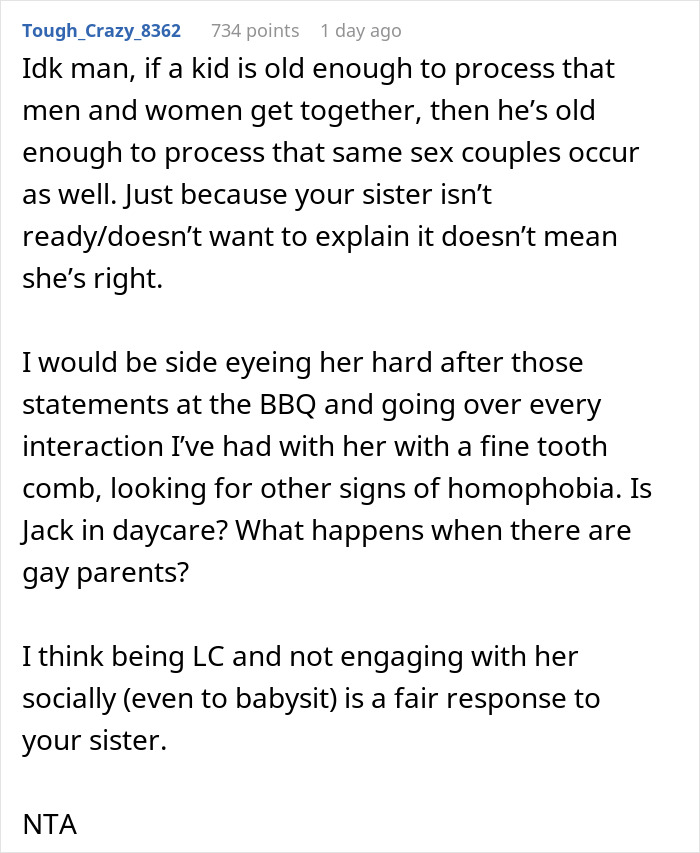
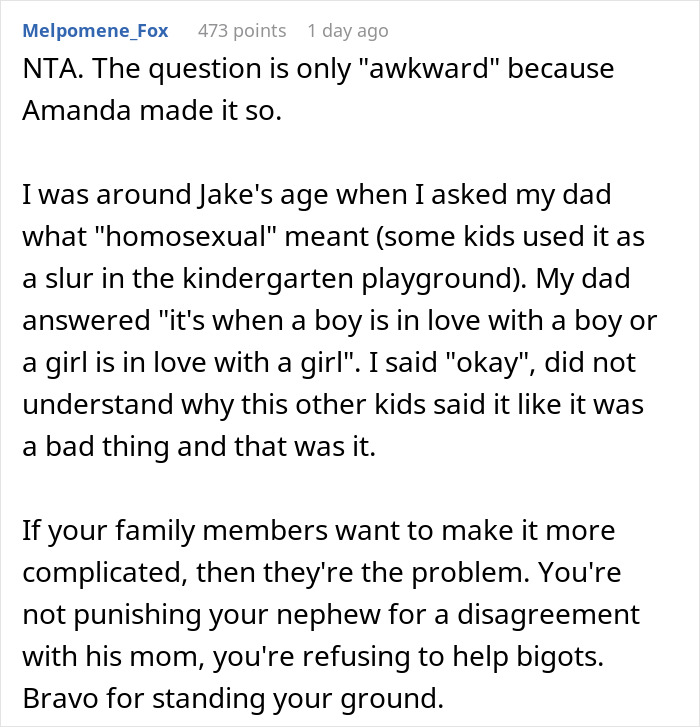
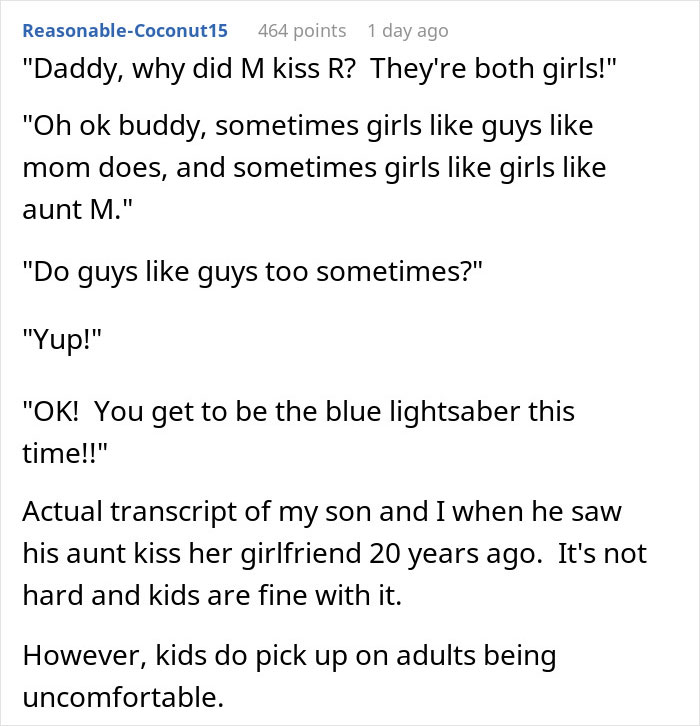
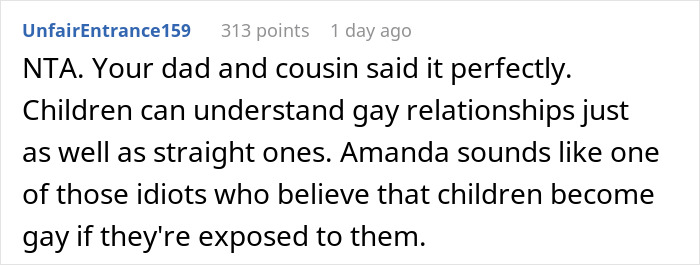
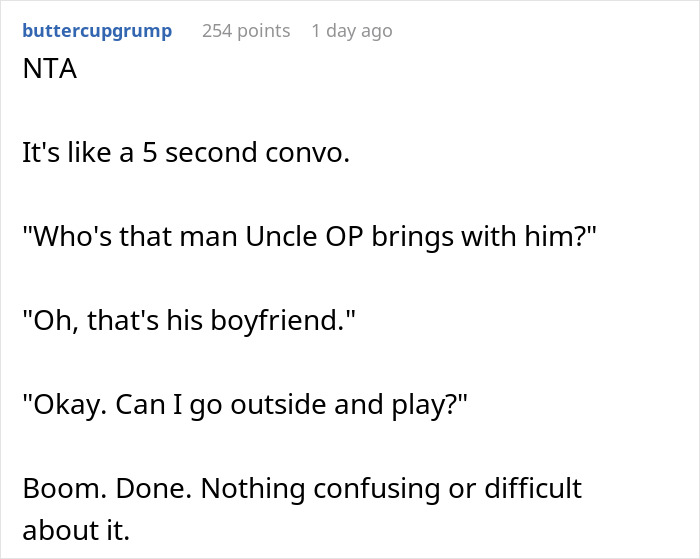
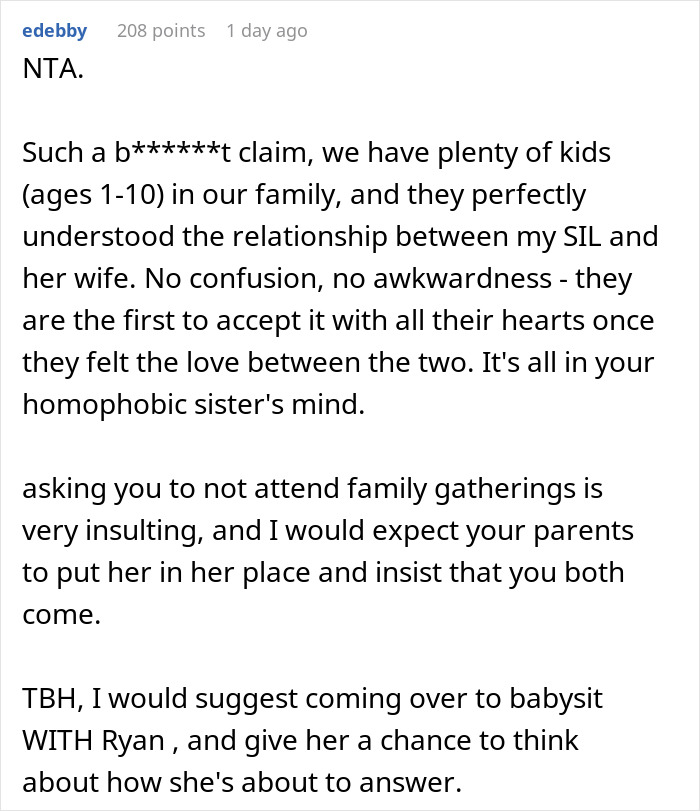
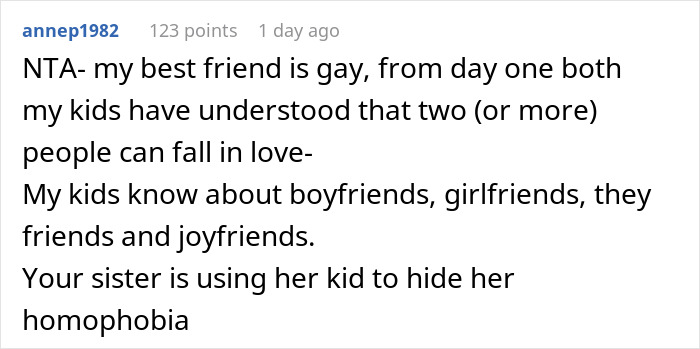
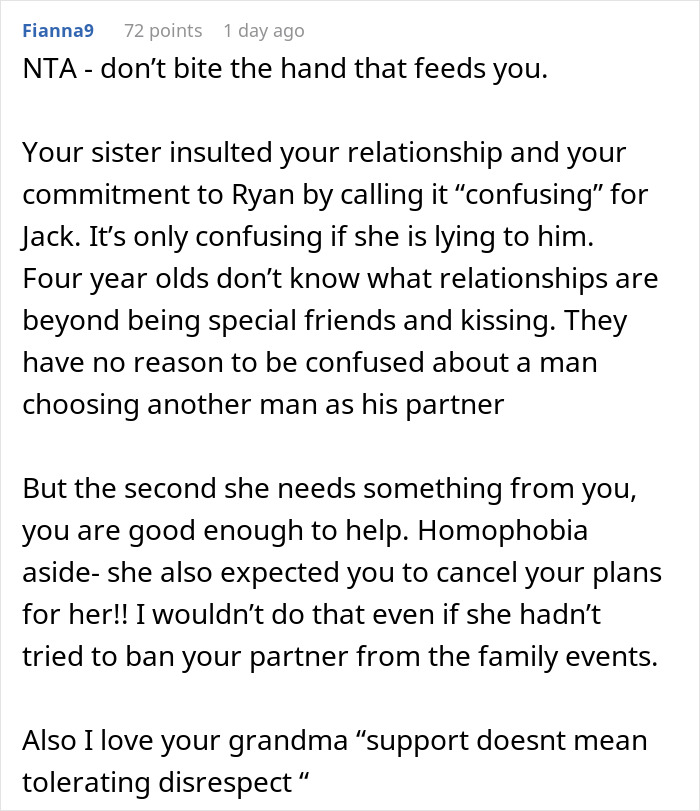
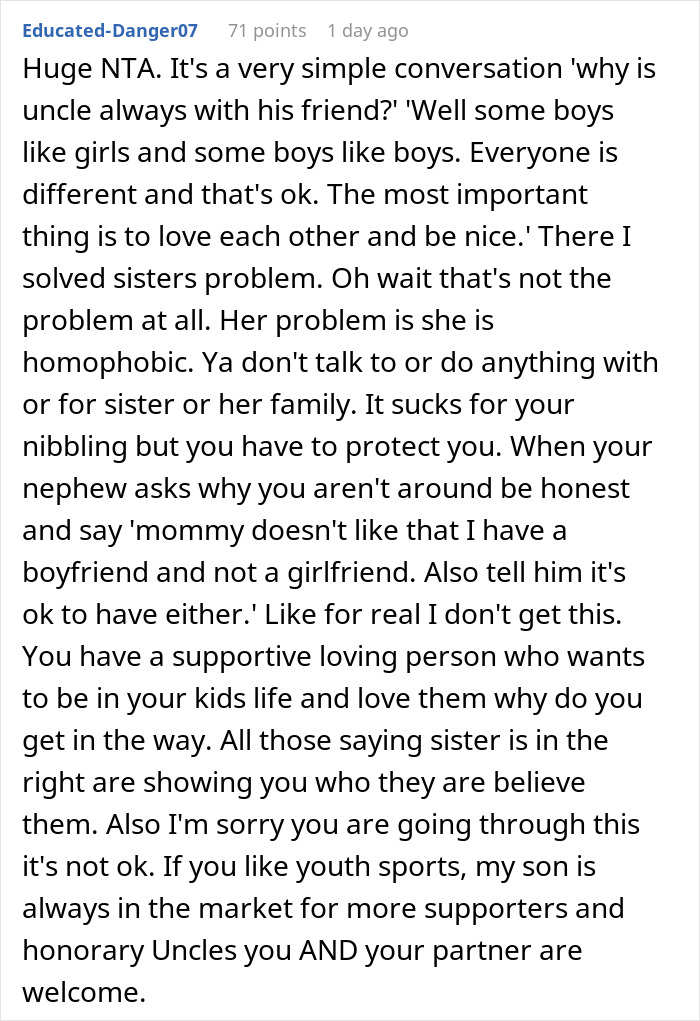
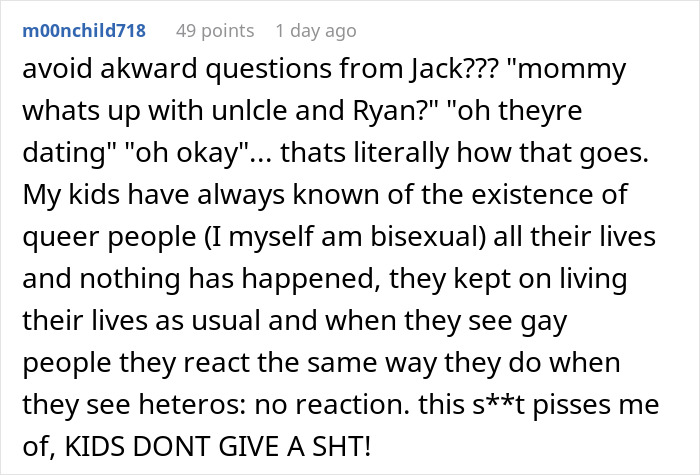
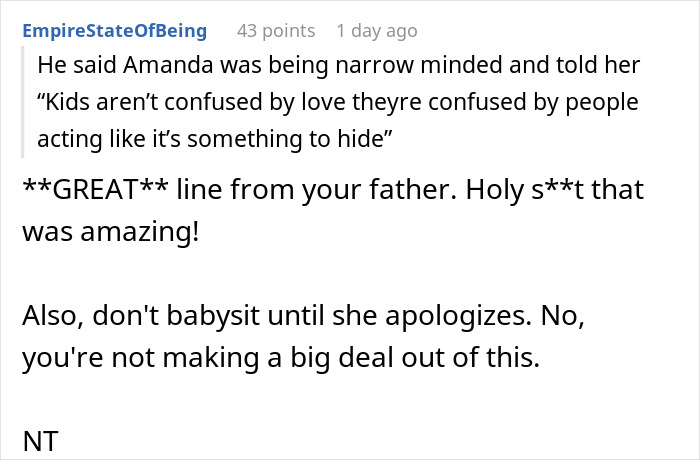
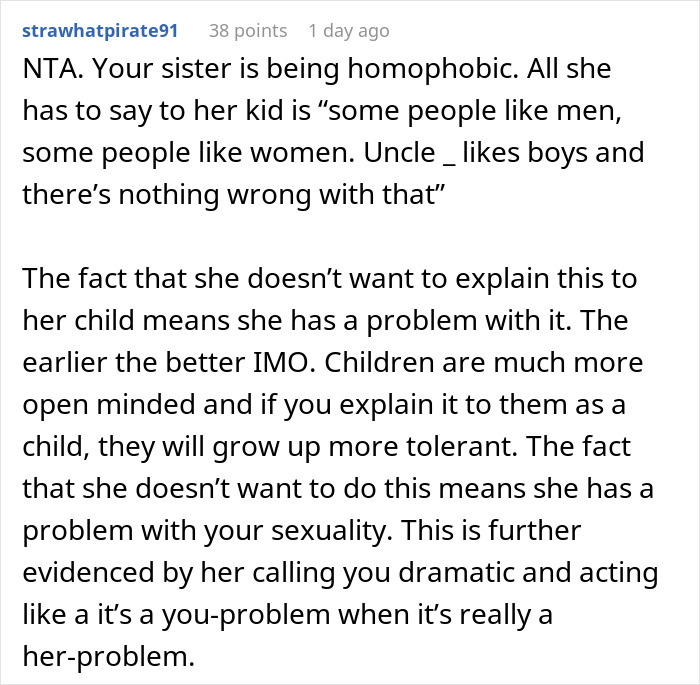
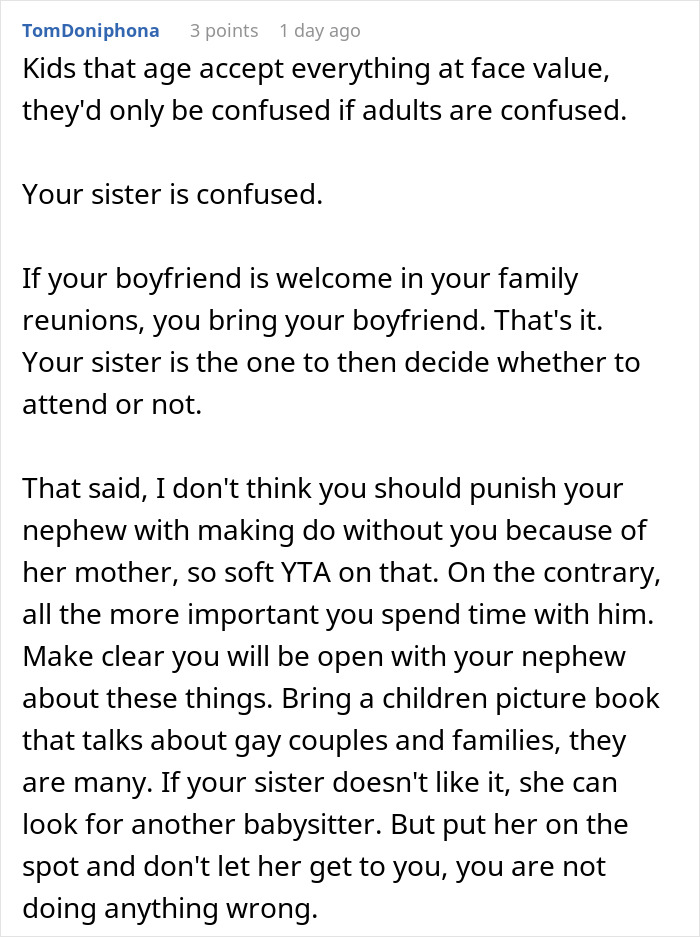
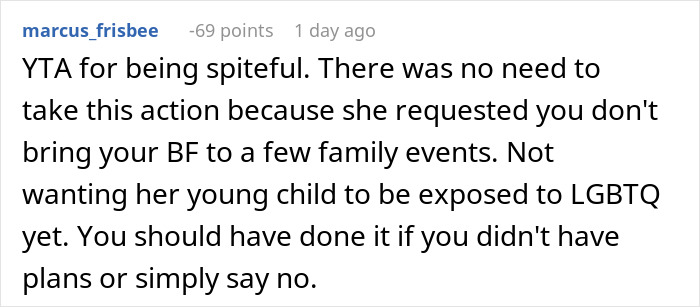
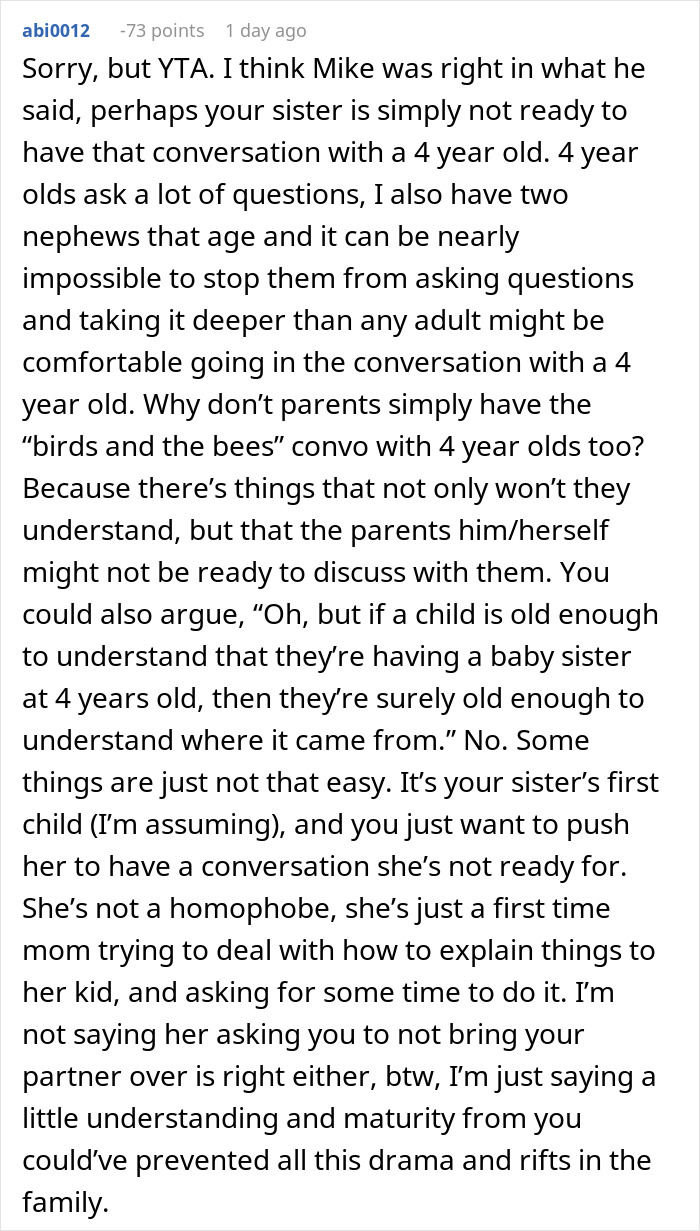











































25
63